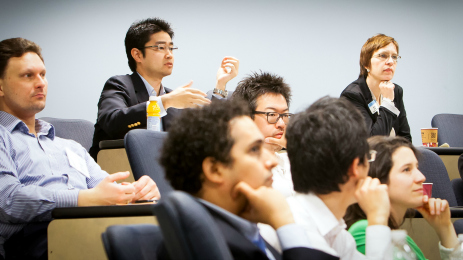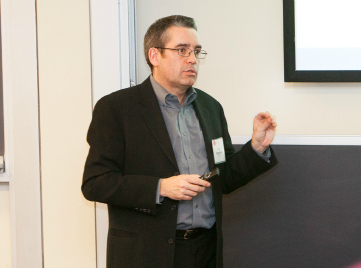News & Stories
Emerging markets: The talent trifecta
 Patrick Casseday knows that securing talented employees for his global company, Schneider Electric, isn’t all about the money — sometime it’s about the experience he’s offering, too.
Patrick Casseday knows that securing talented employees for his global company, Schneider Electric, isn’t all about the money — sometime it’s about the experience he’s offering, too.
“I always say, ‘We may not pay you the most, but we have employee processes that will make you want to stay,’” he said. “We’ll encourage you to grow your career.”
Casseday spoke at UNC Kenan-Flagler’s first Emerging Markets Conference, organized by the Global Business Center and the Emerging Markets Club, on Feb. 21. The event brought together business and academic experts to discuss the changing face of emerging markets and how companies can succeed in them.
Casseday is director of leadership and executive development at Schneider, a specialist in energy management with headquarters in Rueil-Malmaison, Île-de-France.
He spoke on a panel that explored fresh approaches to attracting, developing and retaining local talent for sustainable growth in emerging markets.
 Joining him were Andy Diggelmann, vice president of research and development, planning, operations and strategy at SAS, the global business analytics and software company based in Cary, N.C., and Susan Palmer, adjunct professor of organizational behavior at UNC Kenan-Flagler.
Joining him were Andy Diggelmann, vice president of research and development, planning, operations and strategy at SAS, the global business analytics and software company based in Cary, N.C., and Susan Palmer, adjunct professor of organizational behavior at UNC Kenan-Flagler.
Global employers are facing a talent shortage, in addition to a multitude of changes in how employees view their jobs, said Palmer.
In 2013, 35 percent of companies said that they had trouble filling jobs — a figure that has risen steadily since 2008. “What employers are faced with is having to find the right employees at the right time for the right cost,” she said.
At the same time, what brings in employees is changing, too, according to the 2012 Global Workforce Study. Though base pay and job security still drive initial attraction, things like work-life balance, relationships with supervisors and goal setting now play a larger role in employee retention and engagement, Palmer said.
As the dynamic of the workforce has changed, so has Schneider’s approach to employee retention. “It used to be you started with a company, they took care of you until you literally died. It was easy to hire people in that environment. Not anymore,” Casseday said. “Employees are the ones in charge of their own careers now. We do not want you doing the same job for the next 30 years. We want you to grow.”
SAS also has developed a strong formula for employee engagement, said Diggelmann.
“What attracts talent as a global company? Vision, goals, the sense of, ‘what can I contribute to a higher goal?’” he said. “Those are intangible but incredibly important parts of the way we brand ourselves to potential employees.”
SAS has created a company culture that focuses on removing communication barriers, a common set of values, good managers and straightforward communication. The result is a company that scores global workplace awards every year, Diggelmann said.
SAS’ global employees work across different cultures, but they have the same needs at a basic level. “They want to know why what I do everyday matters. They want to know how they contribute. They want to be appreciated for that,” he said.
Casseday agreed, adding that Schneider has implemented employee programs that address those needs.
“The world is not flat, we cannot treat everyone the same,” he said. “But I’ve found that the things that attract people, retain and engage them don’t change.”
Sponsors of the conference were Century Bridge Capital, Hershey’s and the N.C. Center for Global Logistics.